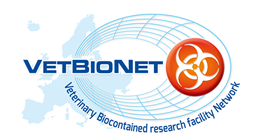TNA news: Transnational Access projects using unusual species
The Animal and Plant Health Agency (APHA) at Weybridge in the UK has recently undertaken a transnational access in its high containment animal facility for the Swedish National Veterinary Institute (SVA) comparing the early stages of African Swine Fever (ASF) in wild boar with domestic pigs.
Currently, ASF constitutes the biggest threat faced by the world pork industry in decades. There is no treatment or effective vaccine commercially available. The disease was endemic in most sub-Saharan countries in Africa and in Sardinia Island (Italy) until 2007 when the virus re-emerged in Eastern Europe. Since then, ASF has spread without control into Western Europe, also reaching China in 2018, the largest pork producing country, from where it has extended to most of the neighbouring South East Asia countries.
 Wild boar have been shown to be as susceptible as domestic pigs. In Europe, the disease established self-sustaining cycles within the wild boar population, a key factor that helped its spread and maintenance, representing a significant reservoir that may hinder eradication and serve as a source for the arthropod vectors of the disease. Experimental results obtained to date in both domestic pigs and wild boar have highlighted variability with regards to experimental outcomes and severity of signs after experimental infections with currently circulating ASFV genotype II isolates in Europe, probably above the expected biological variability, and attributable to the different experimental settings. In addition, little is known about the pathogenic mechanisms or the immune response induced by such genotype II isolates in domestic pigs and, in a lesser extent, wild boar despite their high susceptibility to disease.
Wild boar have been shown to be as susceptible as domestic pigs. In Europe, the disease established self-sustaining cycles within the wild boar population, a key factor that helped its spread and maintenance, representing a significant reservoir that may hinder eradication and serve as a source for the arthropod vectors of the disease. Experimental results obtained to date in both domestic pigs and wild boar have highlighted variability with regards to experimental outcomes and severity of signs after experimental infections with currently circulating ASFV genotype II isolates in Europe, probably above the expected biological variability, and attributable to the different experimental settings. In addition, little is known about the pathogenic mechanisms or the immune response induced by such genotype II isolates in domestic pigs and, in a lesser extent, wild boar despite their high susceptibility to disease.
The aim of this project was to carry out a robust, time-course, comparative experimental inoculation to obtain novel and lacking information on the pathogenesis and immunology of ASF in domestic pigs and wild boar from early stages after infection. For that purpose, an experimental infection with a high virulent ASFV isolate (Armenia 07) was carried out in domestic pigs and wild boar to compare the evolution of clinical signs, lesions, viremia levels, virus shedding, virus burden in target organs and immune responses. The data will fill important knowledge gaps of the differences of ASF between domestic pigs and wild boar and will contribute to better understanding of the epidemiology of the current ASF epidemics in Europe and Asia.
Material generated by the project was not only used by SVA and APHA, but also the Pirbright Institute (a World Animal Health (OIE) reference laboratory of ASF) and ANSES, the French Agency for Food, Environmental and Occupational Health and Safety.
One of the next Transnational Access projects to be undertaken at APHA will involve Influenza C and D using Alpacas for a research group at a French Veterinary School.

